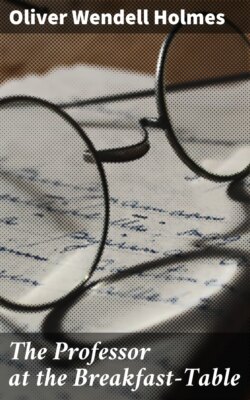Читать книгу The Professor at the Breakfast-Table - Oliver Wendell Holmes - Страница 5
На сайте Литреса книга снята с продажи.
PREFACE TO THE NEW EDITION
ОглавлениеTable of Contents
This book is one of those which, if it lives for a number of decades, and if it requires any Preface at all, wants a new one every ten years. The first Preface to a book is apt to be explanatory, perhaps apologetic, in the expectation of attacks from various quarters. If the book is in some points in advance of public opinion, it is natural that the writer should try to smooth the way to the reception of his more or less aggressive ideas. He wishes to convince, not to offend—to obtain a hearing for his thought, not to stir up angry opposition in those who do not accept it. There is commonly an anxious look about a first Preface. The author thinks he shall be misapprehended about this or that matter, that his well-meant expressions will probably be invidiously interpreted by those whom he looks upon as prejudiced critics, and if he deals with living questions that he will be attacked as a destructive by the conservatives and reproached for his timidity by the noisier radicals. The first Preface, therefore, is likely to be the weakest part of a work containing the thoughts of an honest writer.
After a time the writer has cooled down from his excitement—has got over his apprehensions, is pleased to find that his book is still read, and that he must write a new Preface. He comes smiling to his task. How many things have explained themselves in the ten or twenty or thirty years since he came before his untried public in those almost plaintive paragraphs in which he introduced himself to his readers—for the Preface writer, no matter how fierce a combatant he may prove, comes on to the stage with his shield on his right arm and his sword in his left hand.
The Professor at the Breakfast-Table came out in the “Atlantic Monthly” and introduced itself without any formal Preface. A quarter of a century later the Preface of 1882, which the reader has just had laid before him, was written. There is no mark of worry, I think, in that. Old opponents had come up and shaken hands with the author they had attacked or denounced. Newspapers which had warned their subscribers against him were glad to get him as a contributor to their columns. A great change had come over the community with reference to their beliefs. Christian believers were united as never before in the feeling that, after all, their common object was to elevate the moral and religious standard of humanity. But within the special compartments of the great Christian fold the marks of division have pronounced themselves in the most unmistakable manner. As an example we may take the lines of cleavage which have shown themselves in the two great churches, the Congregational and the Presbyterian, and the very distinct fissure which is manifest in the transplanted Anglican church of this country. Recent circumstances have brought out the fact of the great change in the dogmatic communities which has been going on silently but surely. The licensing of a missionary, the transfer of a Professor from one department to another, the election of a Bishop—each of these movements furnishes evidence that there is no such thing as an air-tight reservoir of doctrinal finalities.
The folding-doors are wide open to every Protestant to enter all the privileged precincts and private apartments of the various exclusive religious organizations. We may demand the credentials of every creed and catechise all the catechisms. So we may discuss the gravest questions unblamed over our morning coffee-cups or our evening tea-cups. There is no rest for the Protestant until he gives up his legendary anthropology and all its dogmatic dependencies.
It is only incidentally, however, that the Professor at the Breakfast-Table handles matters which are the subjects of religious controversy. The reader who is sensitive about having his fixed beliefs dealt with as if they were open to question had better skip the pages which look as if they would disturb his complacency. “Faith” is the most precious of possessions, and it dislikes being meddled with. It means, of course, self-trust—that is, a belief in the value of our own opinion of a doctrine, of a church, of a religion, of a Being, a belief quite independent of any evidence that we can bring to convince a jury of our fellow beings. Its roots are thus inextricably entangled with those of self-love and bleed as mandrakes were said to, when pulled up as weeds. Some persons may even at this late day take offence at a few opinions expressed in the following pages, but most of these passages will be read without loss of temper by those who disagree with them, and by-and-by they may be found too timid and conservative for intelligent readers, if they are still read by any.
BEVERLY FARM, MASS., June 18, 1891. O. W. H.
